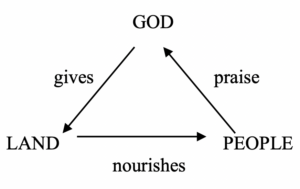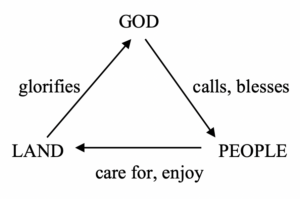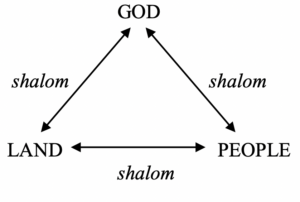HONORING GOD’s COVENANT: Caring for the Earth
Free Methodists and Creation Care
Honoring God’s Covenant: Caring for the Earth
Howard A. Snyder
Introduction
God has an everlasting covenant with His earth, as well as with His people. Since we humans are God’s stewards on earth, called to care for the garden (Genesis 2:15), God’s earth covenant is our stewardship commission. This is particularly true for Free Methodists, called to “maintain the Bible standard of Christianity.”
God’s Covenant with the Earth
The Lord God brings salvation to earth through a series of revealed covenants, culminating in the New Covenant in the blood of Jesus Christ. The first of these covenants, following humanity’s fall into sin and after the flood, is revealed in Genesis 9.
God says to Noah after the flood, “I am establishing my covenant with you and your descendants after you, and with every living creature that is with you, the birds, the domestic animals, and every animal of the earth with you, as many as came out of the ark” (Genesis 9:9–10 NRSV). God makes it clear that this covenant is “with every living creature” and is “for all generations.” It is in fact an “everlasting covenant” — true and to be observed throughout all history. God calls this simply His “covenant between me and the earth” (Genesis 9:12–16). All covenants have a sign, and the sign of this covenant is the rainbow.
Through His covenant with earth, God acts to preserve the earth. The Lord God limits His judgment (the flood) so He can fulfill larger purposes. Here we see the ever-present biblical focus on God’s concern for people and also the land, the environment we inhabit — the earth God has given us to enjoy and care for, helping it to flourish. Thus, the Bible shows that God’s plan is to save people with their environment, not out of their environment.
The rainbow is God’s cupped hand over the earth. It shines forth His care and concern for the world and its creatures. God sees the rainbow — and remembers His covenant (Genesis 9:14–16). We, His people, should do the same. Enjoying the rainbow, we should recall God’s covenant with all His creatures.
The second covenant is found as Israel was about to enter the promised land. Moses charged them: “When you have eaten and are satisfied, praise the Lord your God for the good land he has given you” (Deuteronomy 8:10 NIV). This short verse holds all the seeds of the biblical understanding of comprehensive, integral mission. It speaks of three realities: God, the people, and the land, showing their proper relationship.

The story in Deuteronomy, and in fact throughout the Bible, is the story of God, people, and the earth. It is the story of God’s action through a chosen people to restore harmony to creation by being a blessing to all earth’s peoples (Genesis 12:3). This is the larger narrative behind Deuteronomy 8:10 — it echoes the Genesis 9 covenant.
God gives the land to the people, the land provides food for and nourishes the people, and the people praise or worship the Lord. These actions form a perfect triangle — the relationship God intends between Himself, His people, and His land.
In other passages of Scripture, the arrows are reversed. God forms and blesses His people, the people are to enjoy and faithfully care for the land (Leviticus 25), and the land shows forth the glory of God (Psalm 19:1).

Here is the God-intended relationship between Yahweh, His people, and the land. Since in Hebrew “land” and “earth” are the same word, this is actually a picture of the God-intended relationship between God, humankind, and the entire created order. This is the relationship God intends but that has been disrupted by sin.
Through Israel, God begins a plan to restore creation. God intends shalom — harmonious, reconciled interrelationship between Himself, His people, and the land. So the arrows point both ways, a perfect ecology.

In the biblical narrative, God creates “the heavens and the earth” (Genesis 1:1), God places humans on the earth, and God plants a garden for the enjoyment and sustenance of community. (This God-people-land covenantal relationship is elaborated fully in Salvation Means Creation Healed, by Howard A. Snyder with Joel Scandrett.)
Jesus-Centered Mission and Creation Care
Jesus-centered mission is not holistic if creation care is not woven into its very DNA. Biblically speaking, God’s redemptive plan involves His whole creation, not just the human part. For in Jesus Christ “all the fullness of God was pleased to dwell, and through him God was pleased to reconcile to himself all things, whether on earth or in heaven, by making peace through the blood of his cross” (Colossians 1:19–20 NRSV). Beginning in Genesis, we see that God’s covenant has always involved the earth as well as people. Therefore, if the gospel doesn’t include the land, it’s not the whole gospel.
John Wesley’s Emphasis on Creation Care
This theme has special resonance for Wesleyan Christians. Wesley emphasized “the wisdom of God in creation” and the Book of Nature (Creation). His persistent focus on “justice, mercy, and truth” and “all inward and outward holiness” embraces earth and all its creatures — nonhuman as well as human — birds, trees, flowers, rivers, fungi — the whole wondrous web of life.
John Wesley’s accent on love for God and neighbor means loving all that God has made (including the created order) and everything that impinges on human well-being (as the health of the environment surely does). Wesley vigorously opposed human slavery. Therefore today, concerned Free Methodists want to abolish the bondage of earthand its creatures from exploiting human masters.
Free Methodists and Creation Care
Free Methodists stand in the long line of faithful disciples, evangelists, and reformers who have sought to be fully faithful to God’s covenants. B. T. Roberts — a farmer as well as a church leader — took up the cause of justice as a founder of the Farmers’ Alliance (see Populist Saints, Chapter 35). He opposed slavery and advocated for women’s rights. He and his wife, Ellen, were deeply concerned with social and economic justice. They cared successfully for their farm in North Chili, New York (now the campus of Roberts Wesleyan College).
Today creation care for Free Methodists means honoring God’s “everlasting covenant” with the earth by giving witness to the Good News of Jesus through faithful, intelligent creation care. One example is Free Methodist Steve Fitch, who embodies the best of FM witness in this area through Eden Reforestation — now a flourishing global movement that honors God’s earth covenant, showing that earth care is a life and death matter.
Five Practical Steps We Endorse Regarding Creation Care
The Holy Spirit gives a wide variety of gifts to His church. Part of ministry is helping people find and use their gifts. Within local churches, Jesus often raises up one, two, or a few with a passion for earth stewardship who can inspire the church to engage practically in creation care.
Earth stewardship can take many forms. Here are some practical ones:
- Include the earth, and creation care, in the church’s teaching, preaching, and Sunday school curriculum.Good, sound material is now available (for example) from the Evangelical Environmental Network. Additionally, teach what the Scriptures say regarding God’s covenants and the earth.
- Make church property a visible sign of earth stewardship. This may include solar panels on church buildings or harnessing wind power. Especially, it means tree planting. Trees give life and oxygen. Planting trees appropriate to the environment is both a witness and an actual contribution to earth’s health.
- Include creation (the Book of Nature) in our spiritual disciplines. This includes prayer, Scripture (noting the hundreds of references to land in the Bible), recycling, and outdoor walks. Enjoying God’s beautiful creation is a cure to “nature-deficit disorder.”
- Start a mission group in the church to study and respond to creation-care challenges locally and globally.
- Support civic efforts to care for the physical environment. This can take many forms — for instance, supporting public officials who effectively address creation care.
In Conclusion
Several biblical themes ground the mandate for creation care. The Bible plan of salvation is one of peace, shalom. In the Bible, shalom is a deeply ecological concept, linking people and their social and physical context. The biblical theology of land, from the Old Testament to the New, “grounds” (literally) salvation in God’s plan for the whole earth. The theme of the earth as God’s habitation implies human respect for and care of nature. The key biblical theme of justice and righteousness — the principal basis for a kingdom of God ethic — rules out harmful exploitation of the land. The incarnation and servanthood of Jesus Christ show what it means to live righteous and godly lives physically, on the earth. The biblical doctrine of the Holy Spirit and of the church as a charismatic body underscores the role of the Spirit in both creation and the renewal of creation (Psalm 104:30).
The doctrine of the Trinity itself is rich in ecological insights, for it implies mutual interdependence and self-giving on behalf of the other rather than self-centered dominance or exploitation. The created order is the way it is because of the way God is. Earth’s unity and diversity reflect in some sense the diversity-within-unity that is the Trinity.
Creation care is thus grounded in God’s character, in Scripture from the beginning, and in the Good News we proclaim. Everything in the gospel, in the kingdom, becomes clearer once we see it through the lens of creation and the promised new creation.
© 2019 Howard A. Snyder – may be freely reprinted. ** *
